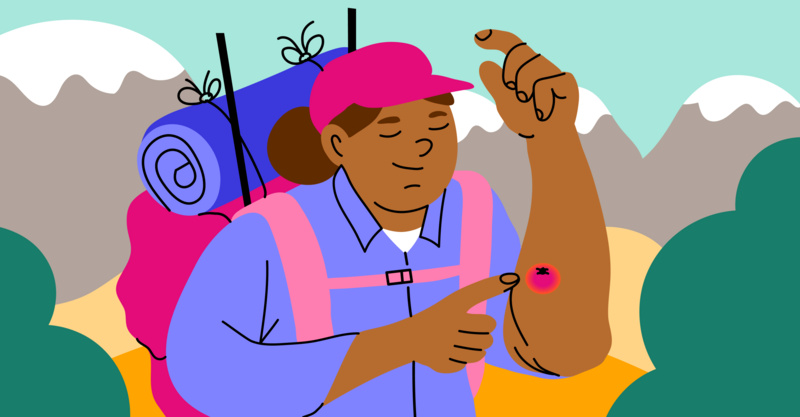Key Points
- There are several viruses circulating in the US right now
- Keep an eye out for enteroviruses, HMPV, Lyme disease, and other “vacation bugs,” including babesiosis
- Doctors are also watching for noroviruses, MPox and COVID
- If you or a loved one experiences symptoms of these viral infections, reach out to urgent care for help
Summer is a time for fun and frolic, beaches and hikes, vacations and…viruses? Unfortunately, as we enjoy the sun, so do ticks and other animals that may spread diseases. With warmer weather, people travel more and also turn the air conditioner up in closed spaces to escape from the heat. These conditions can make the summer months ripe for their fair share of viral infections.
Remember, there is no need to panic or worry. If you or a loved one begin to experience symptoms, know that help is available.
Here are some summer viruses circulating right now, signs to look for, and what you can do about them.
Enteroviruses
There are over 100 types of enteroviruses, but the good news is that they usually cause mild infections, according to the Centers for Disease Control and Prevention (CDC). These viruses spread through the air from person to person through sneezing, coughing, and being in close proximity to an infected person.
Over the past few years, enterovirus EV-D68 has been causing more infections. In 2022, the CDC issued a warning about more children falling ill from EV-D68 infections. It usually causes respiratory illness, but the virus can also be more severe in rare cases.
Symptoms
According to the CDC, symptoms of enteroviruses include:
- Fever
- Runny nose
- Sneezing
- Cough
- Skin rashes
- Mouth blisters
- Body pain
- Muscle aches
When to get medical help?
Dr. Rob Rohatsch, MD, Chief Medical Officer at Solv, explains. “Most enteroviruses cause mild illness, like the summer flu and hand, foot, and mouth disease. In rare cases, they can be severe.”
According to Dr. Rohatsch, you may consider reaching out to a medical professional if you or a loved one experiences symptoms like:
- Shortness of breath
- Difficulty breathing
- Wheezing
- Weakness in arms or legs
- Difficulty swallowing
- Difficulty moving the eyes or eyelids
- Facial droop or weakness
Solv can help you find an urgent care center near you for immediate medical help.
HMPV (Human Metapneumovirus)
Even if you haven’t heard of HMPV, chances are, you have already been exposed to it. It is a common respiratory virus that is a leading cause of respiratory illnesses. A recent CDC report warns of a rise in HMPV cases in the United States.
HMPV cases peaked in March 2023 with 11% of PCR lab tests showing positive results for the virus. In comparison, CDC data shows that before the pandemic, peak positive results were just 7%.
People of all ages are at risk of getting infected with HMPV, although children and seniors are at a higher risk, notes the CDC. Similar to other respiratory viruses, it is spread through sneezing, coughing, shaking hands, touching contaminated surfaces and then touching the mouth, eyes, or nose.
Symptoms
According to the CDC, symptoms of HMPV are:
- Cough
- Fever
- Congestion in the nose
- Shortness of breath
- Difficulty breathing
Symptoms may progress to:
- Bronchitis
- Pneumonia
Diseases spread by ticks: Lyme disease, Powassan fever, Babesiosis
When we talk about tick-borne diseases, most of us have heard of Lyme disease. However, a March 2023 CDC report shows that babesiosis, another infection spread by ticks, is on the rise. US health officials also issued a warning about Powassan fever after a man died from it in May 2023.
Lyme disease
According to the CDC, symptoms of Lyme disease include:
- Fever
- Chills
- Headache
- Fatigue
- Muscle pain
- Joint aches
- Swollen lymph nodes
In addition, 70-80% may experience a rash at the site of the tick bite (can appear in 3-30 days after getting bitten)
According to the CDC, symptoms can progress (a full list of symptoms is here).
When to get medical help?
Dr. Rob Rohatsch says, “In general, if you have the signs of Lyme disease for a few weeks, consider reaching out to a medical professional. Do not wait longer than four weeks. Early intervention is important to prevent symptoms from progressing.”
Powassan Fever
Powassan Fever is rare and many do not even experience symptoms when infected by the Powassan virus, according to the CDC.
Signs of Powassan fever are:
- Fever
- Headache
- Vomiting
- Weakness
According to the CDC, when the disease progresses, symptoms can include confusion, difficulty speaking, and seizures.
When to get medical help?
According to Dr. Rohatsch, “Severe cases of Powassan fever can cause memory loss and brain inflammation (meningitis). If you think you or a loved one may be bitten by ticks, it may be better to get checked. Do let your healthcare provider know about recent travel to tick-infested areas like grassy, brushy, or wooded areas. Consider getting your pets examined and treated for ticks, if found.”
For urgent medical intervention, find an urgent care near you using Solv.
Babesiosis
According to the CDC, although most people feel fine and not even experience symptoms, babesiosis can cause severe illness. It can be life-threatening in people with compromised immunity and other serious health conditions.
Symptoms of babesiosis are flu-like, including:
- Fever
- Chills
- Sweats
- Headache
- Body aches
- Loss of appetite
- Nausea
- Tiredness
- Hemolytic anemia (infects red blood cells)
When to get medical help?
Dr. Rohatsch explains, “Symptoms can start within a week of getting bitten by a tick and develop in a few weeks or months. The disease can be diagnosed only through a blood test. If you think you or a loved one may have symptoms of babesiosis or another tick-borne illness, consider talking to a medical professional to be sure.”
Solv can help you find an urgent care center near you in the click of a button. You can book same-day appointments or virtual consults with a licensed healthcare provider.
Frequently asked questions
What are some common viruses that circulate during the summer months?
Some common viruses that circulate during the summer months include enteroviruses, Human Metapneumovirus (HMPV), and diseases spread by ticks such as Lyme disease, Powassan fever, and Babesiosis.How does the enterovirus spread?
Enteroviruses spread through the air from person to person through sneezing, coughing, and being in close proximity to an infected person.What are the symptoms of enteroviruses?
Symptoms of enteroviruses include fever, runny nose, sneezing, cough, skin rashes, mouth blisters, body pain, and muscle aches.What is Human Metapneumovirus (HMPV) and how does it spread?
HMPV is a common respiratory virus that is a leading cause of respiratory illnesses. It spreads through sneezing, coughing, shaking hands, touching contaminated surfaces, and then touching the mouth, eyes, or nose.What are some diseases spread by ticks?
Some diseases spread by ticks include Lyme disease, Powassan fever, and Babesiosis.What are the symptoms of Lyme disease?
What is Powassan Fever and what are its symptoms?
Powassan Fever is a rare disease spread by ticks. Symptoms can include fever, headache, vomiting, weakness, confusion, difficulty speaking, and seizures.What is Babesiosis and what are its symptoms?
Babesiosis is an infection spread by ticks that can cause severe illness. Symptoms include fever, chills, sweats, headache, body aches, loss of appetite, nausea, tiredness, and hemolytic anemia.
Solv has strict sourcing guidelines and relies on peer-reviewed studies, academic research institutions, and medical associations. We avoid using tertiary references.


 LinkedIn
LinkedIn









![In the Nurse's Office: Common Sicknesses in Schools [Infographic]](https://d1kve3ll6vvkpr.cloudfront.net/dir/media/W1siZiIsIjIwMTMvMDgvMDkvMjJfMjVfMzZfMzU1X2NvbW1vbl9pbGxuZXNzZXNfaW5mb2dyYXBocGljLnBuZyJdLFsicCIsInRodW1iIiwiODAweDQxNyMiXSxbInAiLCJlbmNvZGUiLCJqcGciLCItcXVhbGl0eSA5NSJdXQ/file.jpg?basename=In+the+Nurse%27s+Office%3A+Common+Sicknesses+in+Schools+%5BInfographic%5D&sha=3df4cedf1e5892e9)
